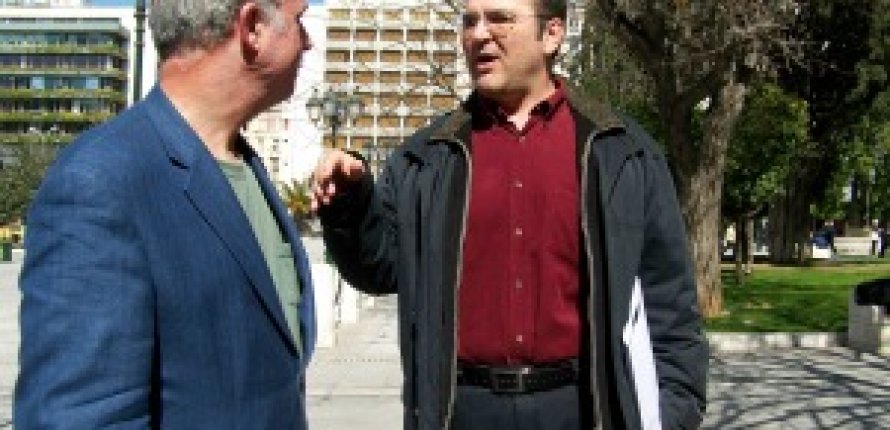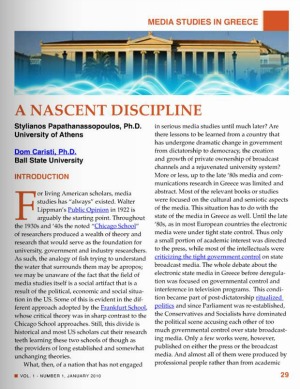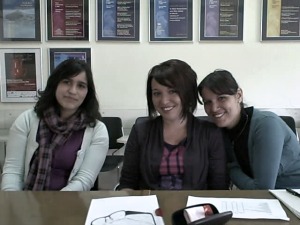The Key to My Fulbright Success

Dom Caristi, Fulbright Alumni Ambassador
Professor, Department of Telecommunications at Ball State University
February – June 2009 Fulbright Scholar to Greece
In 2009, I was privileged to spend a semester as a Fulbright U.S. Scholar at the National and Kapodistrian University of Athens. It was a fabulous experience for both my wife and me. The key to the success of my Fulbright was Department Chair Stylianos “Stelios” Papathanassopoulos. Despite his crushing schedule, he and I met regularly. Our first priority was to arrange my teaching schedule. Things had been somewhat decided before I arrived, but some modifications were made based on our conversations. Stelios didn’t want me to be an itinerant lecturer, popping in and out of classes as a guest lecturer. He assigned me to my own classes. I was given a schedule of three two-hour lectures weekly. While some might think that a heavy load, I wasn’t the professor of record and wasn’t expected to do any of the grading, which made it a teacher’s dream: to be able to teach and not have to grade!
 Accepted article in the inaugural issue of an online pedagogy journal
Accepted article in the inaugural issue of an online pedagogy journal
Stelios and I also worked together on multiple writing projects. He is an established author with an international reputation who didn’t need me as a collaborator, but wanted to increase his collaboration with international scholars. We had an article accepted in the inaugural issue of an online pedagogy journal, seen here to the right.
I also presented a paper at a conference on New Media in Athens that semester (of course Stelios was part of the conference committee). He invited me to rework my paper and include the research as a chapter in a forthcoming book he was co-editing with a British colleague. I was fortunate and lucky to have been selected for the Fulbright and to have collaborated with such a generous and professional colleague.
Additionally, we conducted a seminar for Erasmus exchange students on Comparative Media, one each from Austria, Poland, and Portugal. We put them to work on a comparison of television news stories from Greece and the United Sates, comparing each’s treatment of the same events. We had some very interesting discussions, and we all learned from that exercise.
 Erasmus exchange students on Comparative Media (one each from Austria, Poland, and Portugal)
Erasmus exchange students on Comparative Media (one each from Austria, Poland, and Portugal)
All three of the aforementioned research projects never would have happened if not for the Fulbright. I was introduced to people I would never have met, and forced to think about questions that never would have even occurred to me.
Years after leaving Greece, my wife and I are still in contact with some of the people we met. Of course Stelios and I are in email communication often. I was flattered that he wrote a letter on my behalf both for my promotion to full professor and for the Ball State University Outstanding Faculty Award. Through social media, I have been able to watch many of my Greek students continue to grow. I wrote a graduate school recommendation for one in particular, who was admitted to a graduate program in the U.K. and now works there. By fortunate coincidence, our landlord in Athens was a Fulbrighter who came to the United States as a graduate student decades ago. My wife and I recently hosted him and his wife for several days, and our conversation picked up right where it left off five years earlier.
Not a week goes by that we are not “reconnected” to our Greek Fulbright experience. My wife and I were asked to speak to a group of retirees about Greek cuisine, and we have hosted charity dinners with a Greek theme. Everyone we know has heard about our time in Greece and we talk about it frequently. First-time visitors to our home know of our Fulbright from all the pictures and artifacts displayed in our home (I have a Greek flag in my office) even before we say anything. We even attended a talk by a visiting Byzantine scholar and artist on iconography (something we would never have done without our Greek “connection”). Similarly, we seem to visit more Greek Orthodox churches, Greek festivals, and Greek restaurants than we did pre-Fulbright (it gives us a reason to use the Greek words we learned).
